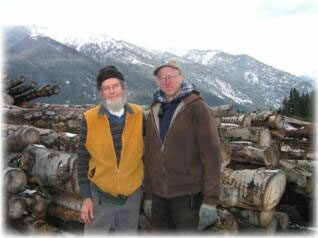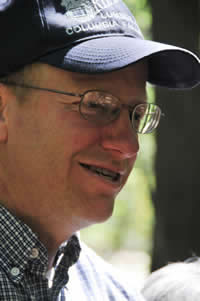Interview with Ben Thompson
Where did you formulate your ideas about sustainability?

Malcolm and Ben Thompson in the woods.
Ben: My dad (Malcolm) and I spend a lot of time in the forest. Over the years our primary focus has evolved into: how can we remove trees without damaging the environment? Without destroying the habitat of the thousands of plant and animal species? We have learned to observe what nature does and try to imitate it. These observations form the basis of our philosophy ... principles that define the business and set limits on what we as a family will do to make the business profitable without exploiting timber resources in an unsustainable way.
Here's the policy we have adopted: "The vast majority of timber we remove is salvage from wind-blown, diseased, insect infested, fire killed trees or from timber cut in a thinning operation to promote growth in the remaining stand. We've structured the company so that as a group we are dedicated to meeting the needs of the company and our customers without compromising the health and stability of the areas in which we work."
Nature and the forest are our perfect example of sustainability because it can go on and on for all time. Nothing is wasted. So we pattern what we do after that.
What is "waste"?
Ben: I think first that sustainability and waste are like opposites. It's impossible to be sustainable if there’s any waste.
What we call waste, and what is waste aren’t necessarily the same thing. To some in our industry, leaving limbs behind ... in fact, leaving anything in the woods to rot, is a waste. But that's not a waste ... it’s needed out there. Nature is always producing stuff it doesn't use, that goes back into the ground. Leaves. Nuts. Branches. Dead animals. But none of those things is waste because it's part of a cycle that keeps rolling forward.
An example of waste would be making a brush pile and burning it. You cut some wood... I have no quarrel with that... the forest won't miss a few trees. But then you gather all the limbs from a bunch of trees into one place ... and burn it! I consider that to be a waste. This takes away the nutrients from a whole area and put it in one spot and burn it. Now if you could spread it out over the whole area and burn it, (without destroying the forest) then it might not be a waste. Because that’s what happens, naturally. So, what people call waste and what is waste, frequently, are two different things.

Ben Thompson
Plastic in a landfill... that’s a waste. In fact, the whole landfill's a waste because everything is just buried ... and prevents a whole group of organisms to make their living, reprocessing everything into a useful form again. So, a landfill, and especially something totally outside of nature like plastic in a landfill, is not going to do anybody any good. But a log in the woods, laying there rotting, is frequently called waste -- and it’s not. Millions of bugs, beneficial bacteria, worms, birds, mushrooms, rodents, snakes, foxes, raccoons ... plus a whole bunch of future bushes and trees ... all make their living off that dead and rotting tree. Even a tree that dies when part of the forest catches fire is not a waste. It feeds a different, and important, part of the whole ecosystem.
If we think about it, most of the trees in the woods are used way longer than anything we cut. A tree in the woods will last 150 years or more... and we hardly ever use wood that lasts that long.

The river, the forest, the Montana sky... it's all part of one interdependent system.